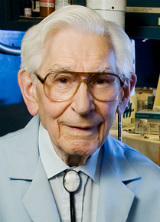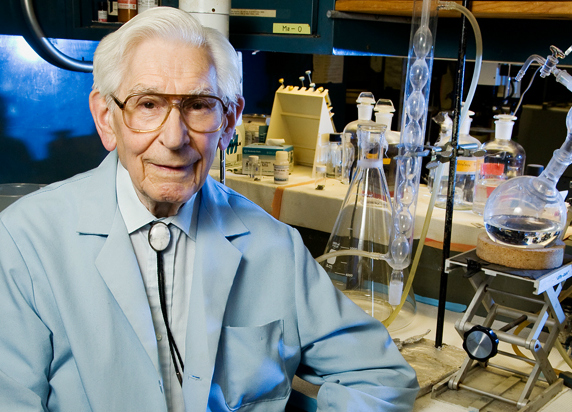Fred Kummerow - Biography

Dr. Fred Kummerow
I was born in Berlin, Germany on October 4th, 1914. There was very little food available during my early years and my mother used to put me and my brother to bed during the day and she would entertain us, rather than let us run around burning calories we didn't have.
In 1923, my father was invited by a relative in Milwaukee, Wisconsin to work in a concrete block factory. As there had been political strife in Germany from 1918 to 1923, my parents decided to move the family to the United States.
I attended Milwaukee's Boys Technical School because they had a three-year chemistry course at the time. I enjoyed learning and have kept learning my entire life. In 1936, I transferred to the Department of Chemistry at the University of Wisconsin in Madison and in 1939 I became a graduate student in the Department of Biochemistry.
My Ph.D. research involved identifying the chemistry of a factor in the blood (linoleic acid) that keeps the blood from clotting in the arteries and veins. This is a particularly important factor in today’s cardiovascular disease research since that clotting affects the blood flow from the heart.
In 1945, I accepted a position in the chemistry department at Kansas State University in Manhattan, Kansas, where I established a basic research program in lipid chemistry. Lipid chemistry is simply the chemistry of fats (e.g., butter, margarine, lard, vegetable oils, trans fats, etc.).
Some of the work at Kansas State involved the technology of storing foods, especially those containing fat. Food with certain fat goes "bad" or rancid quickly. This issue was particularly important during World War II and its aftermath when the American Armed Forces were scattered worldwide.
The Army Quartermaster Corp granted contracts to various universities to develop methods to keep food items edible during extreme conditions. I received such a contract and a citation for this work from the Army Quartermaster Corp in January 1948.
I was part of a project to improve the quality of frozen turkeys and chickens. Essentially our solution was to change the standard poultry diet to one that prevented the fat in the meat from turning rancid. Ultimately this research made the sale of frozen chickens and turkeys possible in grocery stores today.
I was invited to Fort Knox to receive the citation and met Dr. Louis Howard from the University of Illinois who was looking for a biochemist to start a new department. He invited me to move my lipid research program to the University of Illinois in Urbana, Illinois, in 1950, where I have been ever since.
In 1948, the U.S. Congress created the National Institutes of Health (NIH) and made research funds available on a variety of topics, including diet and health. The NIH was mandated to fund research on cancer and other diseases, but only a few million dollars per year were allocated for heart research until after President Eisenhower's heart attack in 1955.
With money available from NIH grants to study heart disease, I began to work in that field. The effect of cholesterol on heart disease was one avenue of study and was the one I followed. Almost everyone now has heard of cholesterol and its possible link to heart disease, with recommendations (I disagree with) to cut back on eating cholesterol containing foods such as eggs and meat, and saturated fats in foods like butter.
A second factor during my career at the University of Illinois was to study the biochemistry of trans fats in foods. Trans fats are now in the news as a health concern. I began documenting my concerns about the negative effects of trans fats in 1957. I am gratified that the FDA has recently proposed measures to ban all manufactured trans fats from our food.
These studies on the dangers of trans fats have shown that arteries change in composition—leading to blockages—in patients with heart disease and that these changes were not related to dietary cholesterol or the concentration of cholesterol in the blood.
Since the late 1970s, I have called attention to the imbalance of nutrients in the American diet that has led to obesity. I have been directly involved in food-related research since 1936. I have been an expert witness on cholesterol for several hearings before the Federal Trade Commission and have reported to a U.S. Senate hearing on nutrition and the biochemistry of cholesterol. I have authored or co-authored over 460 peer-reviewed scientific papers, edited three books, and contributed chapters to six books on the role of trans fat and cholesterol in heart disease.
I am a member of a number of professional organizations and have been named a fellow (a recognition of competence) in the American Association for the Advancement of Sciences, the American College of Nutrition, the American Society of Nutritional Sciences, the International Society for Atherosclerosis, the American Heart Association Council on Arteriosclerosis, Thrombosis and Vascular Biology, and the Council of Clinical cardiology. I have been president of the Illinois Heart Association, a member of the subcommittee on fats of the American Heart Association and I have visited medical and university research laboratories the world over.
Dr. Fred Kummerow

Dr. Fred Kummerow, was a biochemist and food scientist who worked in the field of nutrition for over 70 years.
His major career focus was research into the impact of diet on heart disease.
Dr Kummerow died on May 31st, 2017 at the age of 102.
His book is titled "Cholesterol is Not the Culprit. A Guide to Preventing Heart Disease"
Photo of Dr Kummerow: L. Brian Stauffer
June, 2017






